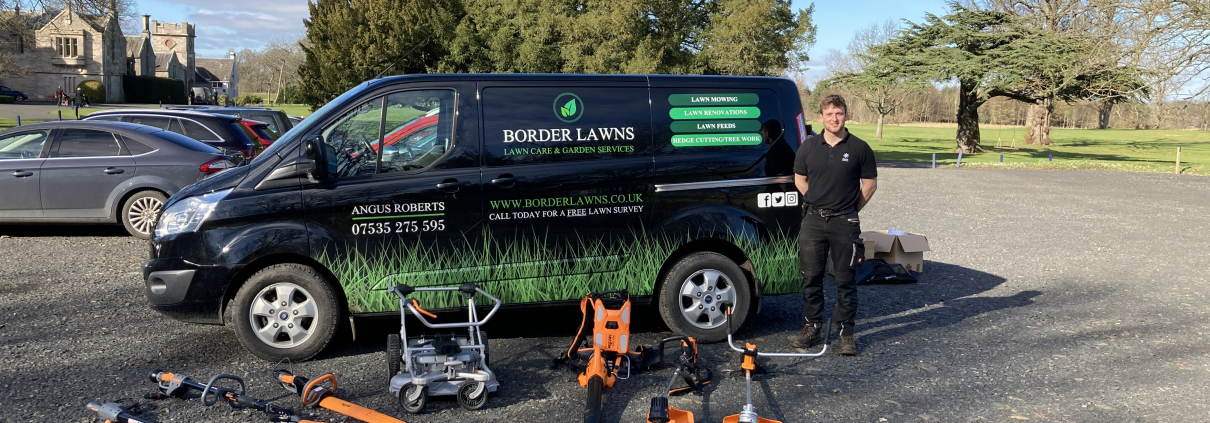Pellenc is the way for Border Lawns
Pellenc is the way for Border Lawns: Angus Roberts believes he has an opportunity to make his new business – Border Lawns, stand out from the competition and he claims that his recent investment in a range of Pellenc products will certainly help his cause.
Angus recently announced that he was stepping away from greenkeeping to set-up a new landscaping business called Border Lawns in Scotland. He admits to it being not without risk though, especially as he held a prominent position as the deputy course manager at the Roxburghe Hotel & Golf Course. However, with youth and experience on his side, it seems a logical decision – even more so when you refer to his already impressive CV.

Pellenc is the way for Border Lawns
Angus left school and began an apprenticeship at the Roxburghe in 2017 but he got his first taste of tournament preparation in 2016 when he volunteered to be part of the BIGGA Volunteer Support Team that helped at the British Masters in 2016.
A year later and he was awarded the prestigious Toro Young Student Greenkeeper of the Year. It was an incredible achievement for someone who had just a year’s full-time greenkeeping experience. Never one to rest on his laurels, Angus continued to impress and as well as achieving his level 3 qualification in greenkeeping, he also received successive promotions at the Roxburghe. However, he now feels the time is right to go it alone.
“I’ve branched out from greenkeeping to form Border Lawns and it is something I have been working on in my spare time for a while now,” said Angus. “The company specialises in lawn treatment and other general services such as mowing and hedge cutting. There is a lot of competition with other big franchise companies but after a lot of research, I do feel there is an opportunity for my company to stand out from the crowd.”
To do this, Angus believes in only using market leading equipment and it is for this reason that he had his heart set on the Pellenc range of battery-powered equipment.
A forerunner when it comes to lithium-ion technology, Pellenc has established itself as the number one choice in the ‘zero emission’ professional power tools market for the maintenance of urban and green-spaces.
Light, odourless, noise-free, with no starting problems and enough power to enable professional users to work for a full day on a single charge, it’s no wonder more and more professional users are turning to Pellenc. It is an attractive alternative to those who have, for several years, been relying on fuel-based machinery.
With an extensive product list available from Pellenc, Angus chose to invest in a whole new fleet consisting of chainsaws, blowers, hedge cutters, brushcutters pole saws, grass strimmers and mowers. All these products will be powered by 1200 and 1500 ultra-lithium batteries.
“I first saw the products being demonstrated by Agrovista Amenity when I was working at the golf course and I was taken aback,” he said. “I have used lots of petrol-powered machinery over the years and they have been great but there is an expense to keep them going, and you do get issues with them. As a company I would like to be environmentally sustainable and benefit from the long-term savings that can be achieved through battery-powered products.
As Angus says, not only will users see a huge amount of savings by eliminating the necessity of purchasing fuel but by using the Pellenc equipment, they will be contributing to protecting the environment by reducing the consumption of fossil fuels and noise pollution.
“The fact that they are so quiet and comfortable are huge benefits too,” continued Angus. “I can start work earlier in the morning because the equipment doesn’t disturb anyone, and I can work for longer periods because the machinery doesn’t scream my head off!
“The run time of the Pellenc equipment is so far ahead of all of the other electric products out there. They are waterproof with an IP54 rating too so I can work in any weather – which is vital. Another big benefit is that the batteries are recyclable.
Pellenc UK recently announced the launch of an industry leading four-year commercial warranty for all batteries and three-year warranty for all tools – something which further impressed Angus.
“The warranty is a great peace of mind,” he said. “Ultimately, the Pellenc equipment is powerful, reliable, environmentally friendly and keeps its worth for several years – it is a good investment in my opinion. Allan Wright from Agrovista Amenity, who supplied the equipment, has also been very helpful – that’s exactly what you need from a dealer.”
Pellenc products are exclusively distributed in the UK by Etesia UK.
For further information, please contact Etesia UK on 01295 680120 or visit www.pellencuk.com
You can also follow Pellenc on Twitter, Facebook and Instagram @PellencUK for much more news, reviews and insightful views.
For the latest industry news visit turfmatters.co.uk/news
Get all of the big headlines, pictures, opinions and videos on stories that matter to you.
Follow us on Twitter and Instagram for fun, fresh and engaging content.
You can also find us on Facebook for more of your must-see news, features, videos and pictures from Turf Matters.

















